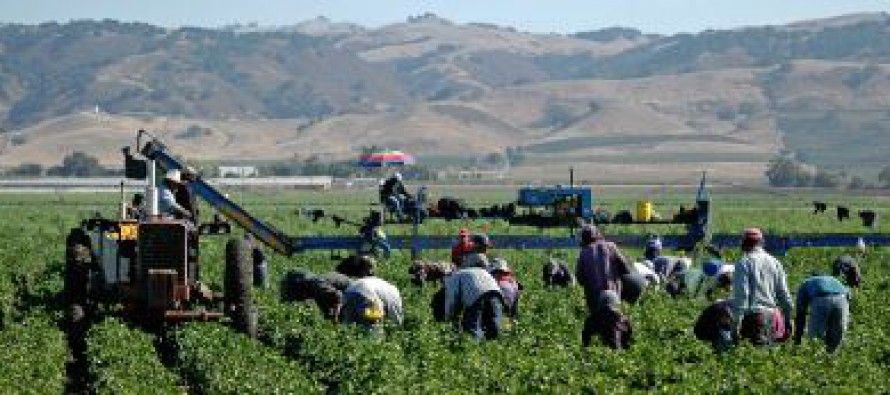CA farmers lead new immigration push

 Immigration has become the biggest national issue involving California’s farmers. In the state’s agricultural heartland, a host of issues are on the agenda, ranging from this year’s painful drought to marijuana eradication.
Immigration has become the biggest national issue involving California’s farmers. In the state’s agricultural heartland, a host of issues are on the agenda, ranging from this year’s painful drought to marijuana eradication.
But one matter looms large. Farmers need more laborers to work the fields, and Americans have not stepped up to the plate.
That has not just been a problem for California. In New Jersey and Pennsylvania, for instance, the challenge has been the same. As the Philadelphia Inquirer put it, local workers “don’t like the job and don’t stay long.” The immigrants who replace them, meanwhile, are sniffed out by the federal government and ordered to be dismissed.
With pressures like those, America’s farmers have eagerly joined a renewed push for nationwide guest-worker laws. They have been joined by a powerful coalition of special interests to press for changes. Trade groups, chambers of commerce, and municipal organizations all benefit from cheap and plentiful labor.
California’s agriculture lobby, however, sought an especially high profile in the drive to give legal status to undocumented workers. That’s exactly what they got. The Los Angeles Times recently claimed that “except for illegal immigrants, no group has more at stake in the national fight over immigration reform than California farmers.”
Late last month, The New York Times ran a big profile. Headlined, “California Farmers Short of Labor, and Patience,” the report focused on the political stakes. Thanks to declining rates of immigration and increased deportations, agricultural employers have faced a steadily shrinking labor pool.
GOP divisions
Meanwhile, the California GOP has shied away from any comprehensive plan for immigrant legalization. That has led traditionally Republican growers and farmers to question whether their party deserves their money this election cycle. And it’s led others to consider simply moving their operations to Mexico.
Only a few California Republicans have responded to the tension by supporting measures to offer a “path to citizenship.” Democrats have been quick to capitalize. According to a new Department of Agriculture report pushed by Secretary Tom Vilsack, California could lose over $3 billion a year if immigrant farm labor doesn’t increase past its current 74 percent mark of the total farm work force.
By any measure, that’s already a very high proportion. Conservatives unhappy with the costs of the current system have condemned the farmers’ discontent. For critics including Ann Coulter, big employers of illegal workers have much to be thankful for. Current law allows them to turn a profit, while citizens pay for workers’ social services. What’s more, California ranks 10th among the 50 states collecting farm subsidies, with $10.3 billion handed out from 1995 to 2012.
Yet a closer look at the data has revealed a more complex picture. In one example, only 9 percent of California farms have collected subsidies, according to the Department of Agriculture.
The immigration issue doesn’t just divide Republicans in California. It divides California farmers. Some naturally align with the pro-business agenda of the party establishment. Others fit better with a more populist, independent agenda.
For these farmers, frustrations over immigration are part of a long-term grievance against the state and federal governments. At the Western Farm Press, Todd Fitchette summed up their mood in a single idea: California farmers have done more to help Mexican immigrants “than any political program dreamed up in an office in Washington, D.C. or Sacramento.”
Related Articles
The Polite Sacramento Tea Party
The tax day Tea Party held at the state capitol in Sacramento was a bustling event, attended by colorful, patriotic
Bill Would Worsen CA High-Tax Status
Editor’s Note: This is an open letter from San Diego Tax Fighters President Richard Rider regarding a new bill making
Poll shows heavy support for local control over housing
In January 2017, state lawmakers returned to the Capitol determined to make a difference on the state housing crisis. Dozens




